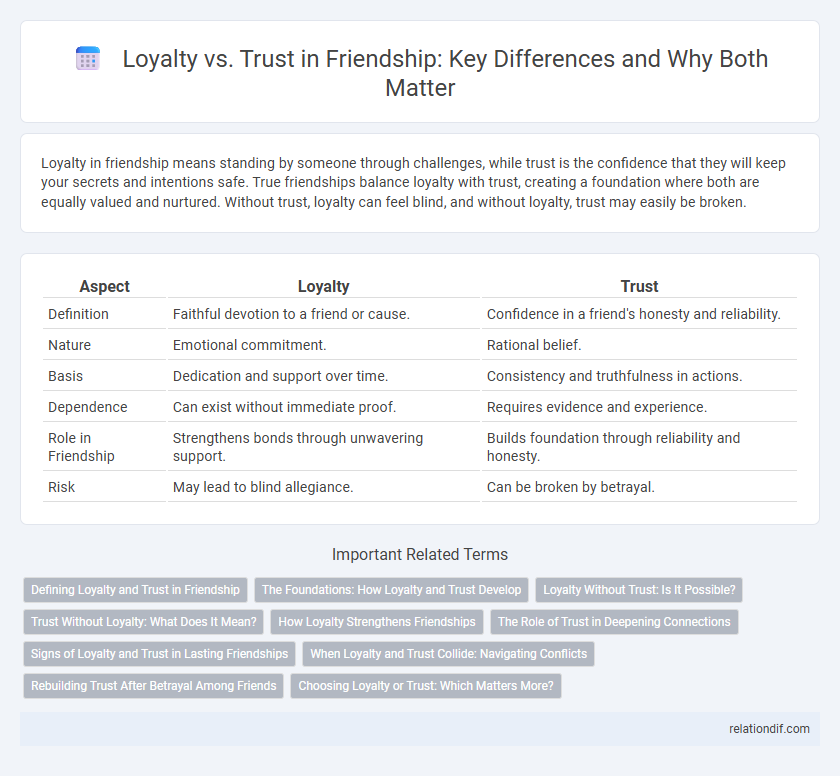Loyalty in friendship means standing by someone through challenges, while trust is the confidence that they will keep your secrets and intentions safe. True friendships balance loyalty with trust, creating a foundation where both are equally valued and nurtured. Without trust, loyalty can feel blind, and without loyalty, trust may easily be broken.
Table of Comparison
| Aspect | Loyalty | Trust |
|---|---|---|
| Definition | Faithful devotion to a friend or cause. | Confidence in a friend's honesty and reliability. |
| Nature | Emotional commitment. | Rational belief. |
| Basis | Dedication and support over time. | Consistency and truthfulness in actions. |
| Dependence | Can exist without immediate proof. | Requires evidence and experience. |
| Role in Friendship | Strengthens bonds through unwavering support. | Builds foundation through reliability and honesty. |
| Risk | May lead to blind allegiance. | Can be broken by betrayal. |
Defining Loyalty and Trust in Friendship
Loyalty in friendship refers to unwavering support and commitment regardless of circumstances, while trust is the confidence that friends will act with honesty and integrity. Loyalty often manifests through consistent actions that reinforce reliability, whereas trust is established through past experiences of dependability and truthfulness. Both elements are essential for a strong friendship but serve distinct roles: loyalty anchors the relationship, and trust builds the foundation for open communication.
The Foundations: How Loyalty and Trust Develop
Loyalty in friendship develops through consistent support and shared experiences that reinforce mutual commitment, creating a stable bond over time. Trust is built by demonstrating honesty, reliability, and vulnerability, allowing friends to feel safe and confident in each other's intentions. Together, loyalty and trust form the foundation of lasting friendships, where actions align with words and emotional security thrives.
Loyalty Without Trust: Is It Possible?
Loyalty without trust challenges the foundation of meaningful friendships, as loyalty demands unwavering support even when trust is compromised. Friends may remain loyal out of commitment or obligation despite doubts, but the absence of trust often leads to anxiety and fractured communication. Sustaining loyalty without trust requires transparent dialogue and a willingness to rebuild confidence over time.
Trust Without Loyalty: What Does It Mean?
Trust without loyalty in friendship implies confidence in someone's honesty or reliability without a deep, unwavering commitment to support them through challenges. It reflects a relationship based on expectation rather than mutual dedication, often leading to fragile bonds prone to dissolution under stress. Understanding this distinction helps clarify the foundation of genuine friendships that balance trust with loyalty for enduring connection.
How Loyalty Strengthens Friendships
Loyalty serves as the foundation for enduring friendships by fostering a sense of reliability and unwavering support even during challenges. It creates a secure environment where trust naturally flourishes, allowing friends to share vulnerabilities without fear of judgment or betrayal. This steadfast devotion enhances emotional bonds, making relationships more resilient and deeply connected over time.
The Role of Trust in Deepening Connections
Trust acts as the cornerstone of meaningful friendships, enabling individuals to share vulnerabilities without fear of judgment or betrayal. When trust is established, loyalty naturally follows, reinforcing a bond that withstands challenges and misunderstandings. Deepening connections through consistent honesty and reliability transforms casual acquaintances into lifelong allies.
Signs of Loyalty and Trust in Lasting Friendships
Signs of loyalty in lasting friendships include consistent support during difficult times and defending each other in their absence, which builds a strong foundation for trust. Trust is evident through open communication, sharing personal thoughts without fear of judgment, and reliability in keeping confidences. Together, these traits create enduring bonds that withstand challenges and foster mutual respect.
When Loyalty and Trust Collide: Navigating Conflicts
Loyalty in friendship demands unwavering support, while trust hinges on honesty and transparency, creating tension when secrets or mistakes surface. Navigating conflicts requires open communication to reconcile loyalty's protection with trust's need for truth, preserving the relationship's integrity. Balancing these elements fosters resilience, allowing friends to grow stronger despite challenges.
Rebuilding Trust After Betrayal Among Friends
Rebuilding trust after betrayal among friends requires consistent actions that demonstrate reliability and honesty over time. Loyalty is reinforced through transparent communication and accountability, allowing the injured party to witness genuine commitment to mend the relationship. Establishing new boundaries and patience are essential as both friends navigate the healing process and work toward restoring mutual confidence.
Choosing Loyalty or Trust: Which Matters More?
Choosing loyalty or trust in friendship hinges on understanding their unique roles; loyalty ensures steadfast support through challenges, while trust builds the foundation for openness and vulnerability. Loyalty without trust risks blind allegiance that may overlook harmful behavior, whereas trust without loyalty can lead to fragile bonds vulnerable to abandonment. Evaluating which matters more depends on the friendship's context, but a balanced integration of both creates the strongest, most enduring relationships.
loyalty vs trust Infographic

 relationdif.com
relationdif.com